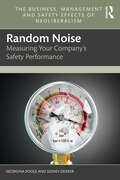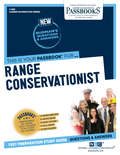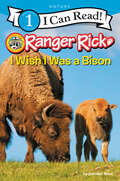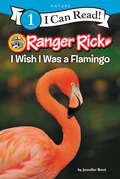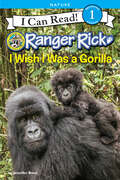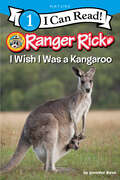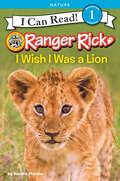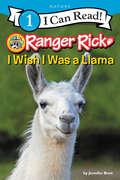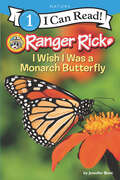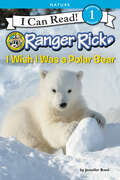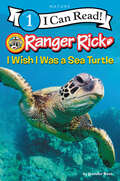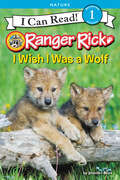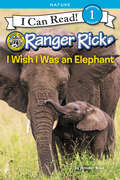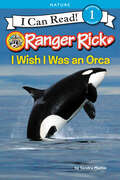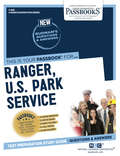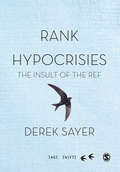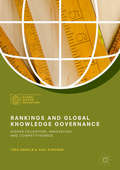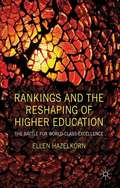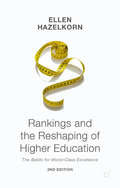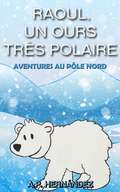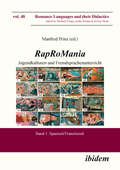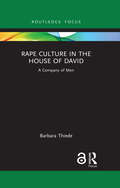- Table View
- List View
Random Noise: Measuring Your Company's Safety Performance (The Business, Management and Safety Effects of Neoliberalism)
by Sidney Dekker Georgina PooleIn the realm of safety management, this book embarks on a profound exploration of how the political economy was reshaped in the last two decades. Much like privatization, deregulation, and financialization altered the economic landscape, this narrative unveils how safety management has been affected by the intertwined dynamics of asset underinvestment, privatization, self-regulation, workplace flexibilization, and market-driven policies.This book, the second installment of a thought-provoking trilogy on the consequences of neoliberalism, mirrors the political economy's promotion of the private sector's role in the economy. Just as neoliberalism amplified and accelerated the mechanisms of human-made disasters in complex systems, this narrative lays bare the heightened potential for safety misfortunes when governed by market-driven principles.As the story unfolds, the book delves into the concept of 'synoptic legibility' in safety management, akin to how the political economy distilled its essence into privatization and deregulation. The authors scrutinize the consequences of translating safety measures into rigid targets, unveiling how this shift can distort the integrity of safety metrics and inadvertently harm individuals. Drawing parallels with historical blunders such as England's window tax, the book contemplates the precarious nature of equating simplified metrics with safety achievements. Much like the political economy's 'acceptable risk' renegotiations, it examines how the pursuit of safety through metrics and surveillance can lead to 'manufactured insecurity,' eroding trust, autonomy, and professionalism.In Random Noise, Poole and Dekker extend this reach once again, writing for all managers, board members, organization leaders, consultants, practitioners, researchers, lecturers, students, and investigators curious to understand the genuine nature of organizational and safety performance.
Randy and the Perfect Boy (Girl Talk #33)
by L. E. BlairRodolfo comes from another country, but as far as Randy is concerned, he acts like he comes from the moon! If she had to do it all over again, Randy never would have volunteered to let Rodolfo Ortiz, the new exchange student from Costa Rica, stay at their house. Rodolfo speaks excellent English and is gorgeous to look at. Everything should be awesome--except that Randy and Rodolfo just can't seem to get along. Once you get to know Sabrina, Allison, Katie and Randy you'll want to get in on all of their girl talk. There are over 30 more books in the Girl Talk series in the Bookshare Collection so you can start from the beginning with book #1, Welcome to Junior High, and continue with: #2 Face Off!, #3 The New You, #4 Rebel Rebel, #5 It's All in the Stars, #6 The Ghost of Eagle Mountain, #7 Odd Couple, #8 Stealing The Show, #9 Peer Pressure, #10 Falling in Like, #11 Mixed Feelings, #12 Drummer Girl, #13 The Winning Team, #14 Earth Alert!, #15 On The Air, #16 Here Comes The Bride, #17 Star Quality, #18 Keeping The Beat, #19 Family Affair, #20 Rockin' Class Trip, #21 Baby Talk, #22 Problem Dad, #23 House Party, #24 Cousins, #25 Horse Fever, #26 Beauty Queens, #27 Perfect Match, #28 Center Stage, #29 Family Rules, #30 The Bookshop Mystery, #31 It's A Scream! and #32 Katie's Close Call. More Girl Talk books are on the way.
Randy's Big Dream (Girl Talk #37)
by L. E. Blair[From The Back Cover] "Are Randy and her friends ready to be radio stars? Randy thinks it's great when Mr. Hansen, the principal at Bradley Junior High, agrees to let her start a radio station at school. Now everyone will be able to listen to some good music for a change. But even in her wildest dreams Randy has never imagined just what she is in for!" Once you get to know Sabrina, Allison, Katie and Randy you'll want to get in on all of their girl talk. There are over 30 more books in the Girl Talk series in the Bookshare Collection so you can start from the beginning with book #1, Welcome to Junior High, and continue with: #2 Face Off!, #3 The New You, #4 Rebel Rebel, #5 It's All in the Stars, #6 The Ghost of Eagle Mountain, #7 Odd Couple, #8 Stealing The Show, #9 Peer Pressure, #10 Falling in Like, #11 Mixed Feelings, #12 Drummer Girl, #13 The Winning Team, #14 Earth Alert!, #15 On The Air, #16 Here Comes The Bride, #17 Star Quality, #18 Keeping The Beat, #19 Family Affair, #20 Rockin' Class Trip, #21 Baby Talk, #22 Problem Dad, #23 House Party, #24 Cousins, #25 Horse Fever, #26 Beauty Queens, #27 Perfect Match, #28 Center Stage, #29 Family Rules, #30 The Bookshop Mystery, #31 It's A Scream!, #32 Katie's Close Call, #33 Randy and the Perfect Boy, #34 Shape Up, Allison, #35 Katie and Sabrina's Big Competition, and # 36 Sabrina and the Calf-Raising Disaster. More Girl Talk books are on the way.
Range Conservationist: Passbooks Study Guide (Career Examination Series)
by National Learning CorporationThe Range Conservationist Passbook® prepares you for your test by allowing you to take practice exams in the subjects you need to study. It provides hundreds of questions and answers in the areas that will likely be covered on your upcoming exam.
Ranger Rick: I Wish I Was a Bison (I Can Read Level 1)
by Jennifer BovéExplore the lives of bison with Ranger Rick in this beginning reader with full-color photos of bison in the wild! What if you wished you were a bison and then you became one? Could you talk like a bison, with grunts and snorts? Could you eat like a bison, chomping lots and lots of grass? And would you want to? Find out!Ranger Rick explorers can learn all about bison in this reader full of fascinating facts, vivid wildlife photographs, a Wild Words glossary, and a hands-on activity that teaches kids how to to play bison Frisbee!Ranger Rick, the iconic raccoon ambassador from Ranger Rick magazines, engages young readers by comparing and contrasting the life of the bison to the life of the reader. For example, a call-out from Ranger Rick asks: would you rather take a bath or wallow in the dirt?Ranger Rick: I Wish I Was a Bison is a Level One I Can Read book, which means it’s perfect for children learning to sound out words and sentences. Whether shared at home or in a classroom, the short sentences, familiar words, and simple concepts of Level One books support success for children eager to start reading on their own.
Ranger Rick: I Wish I Was a Flamingo (I Can Read Level 1)
by Jennifer BovéExplore the lives of flamingos with Ranger Rick in this Level One I Can Read with full-color photos!What if you wished you were a flamingo and then you became one? Could you eat like a flamingo? Talk like a flamingo? Grow up in a flamingo family? And would you want to? Find out!Ranger Rick explorers can learn all about Flamingos in this reader full of fascinating facts, vivid wildlife photographs, a Wild Words glossary, and a hands-on activity.Ranger Rick: I Wish I Was a Flamingo is a level One I Can Read, which means it’s perfect for children learning to sound out words and sentences.This I Can Read story is perfect for children ages 5 to 7 who are ready to read independently. It’s an excellent choice to keep your kids engaged during homeschooling. This beginning reader is an ideal boredom buster when home from school; it's a great activity for kids, and it helps prevent summer slide.
Ranger Rick: I Wish I Was a Gorilla (I Can Read Level 1)
by Jennifer BovéExplore the lives of gorillas with Ranger Rick in this beginning reader with full-color photos of gorillas in the wild! What if you wished you were a gorilla and then you became one? Could you eat like a gorilla? Sleep like a gorilla? Live in a gorilla family? And would you want to? Find out!Ranger Rick explorers can learn all about gorillas in this reader full of fascinating facts, vivid wildlife photographs, a Wild Words glossary, and a hands-on activity about how to make a snack like a gorilla! Ranger Rick: I Wish I Was a Gorilla is a Level One I Can Read, which means it’s perfect for children learning to sound out words and sentences. Whether shared at home or in a classroom, the short sentences, familiar words, and simple concepts of Level One books support success for children eager to start reading on their own.
Ranger Rick: I Wish I Was a Kangaroo (I Can Read Level 1)
by Jennifer BovéExplore the lives of kangaroos with Ranger Rick in this Level One I Can Read with vivid color photos!What if you wished you were a kangaroo and then you became one? Could you eat like a kangaroo? Move like a kangaroo? Live in a kangaroo family? And would you want to? Find out!This Level One I Can Read answers questions for beginning readers about kangaroos. This format engages young readers by comparing and contrasting the life of the kangaroo to the life of the reader. In call-outs, Ranger Rick asks the reader things like: Can you hop like a kangaroo?Did you know that some kangaroos are great swimmers? Did you know that kangaroos are really fast and can hop up to 40 miles per hour? From Tree Kangaroos to the Rock Wallaby to the more familiar Red Kangaroos, young Ranger Rick explorers will love this Level One I Can Read that helps beginning readers dig a little deeper into the amazing lives of kangaroos.Ranger Rick: I Wish I Was a Kangaroo is complete with fascinating facts, vivid photographs, a Wild Words glossary, and a hands-on activity where you find out how far you can jump—just like a kangaroo!This Level 1 I Can Read story is perfect for children ages 5 to 7 who are ready to read independently. Whether shared at home or in a classroom, the short sentences, familiar words, and simple concepts of Level One books support success for children eager to start reading on their own.
Ranger Rick: I Wish I Was a Lion (I Can Read Level 1)
by Sandra MarkleDig into the lives of lions with Ranger Rick in this beginning reader with full-color photos of lions in the wild! What if you wished you were a lion? And then you became one? Could you eat like a lion? Sleep like a lion? Live in a lion family? And would you want to? Find out! Ranger Rick explorers can learn all about lions in this reader full of fascinating facts, vivid wildlife photographs, a Wild Words glossary, and a hands-on activity about practicing your lion-quick reflexes!Ranger Rick: I Wish I Was a Lion is a Level One I Can Read, which means it’s perfect for children learning to sound out words and sentences. Whether shared at home or in a classroom, the short sentences, familiar words, and simple concepts of Level One books support success for children eager to start reading on their own.
Ranger Rick: I Wish I Was a Llama (I Can Read Level 1)
by Jennifer BovéExplore the lives of llamas with Ranger Rick in this beginning reader with full-color photos of llamas in action! What if you wished you were a llama and then you became one? Could you talk like a llama, with gurgles and squeals? Could you roll in the dust like a llama, to keep bugs away? And would you want to? Find out about llamas and their wild cousins, guanacos (pronounced wah-nah-ko), as well as alpacas and vicuñas!Ranger Rick explorers will love this Level One I Can Read that helps beginning readers dig a little deeper into the lives of llamas. Ranger Rick: I Wish I Was a Llama is complete with vivid photographs, fascinating facts, a Wild Words glossary, and a hands-on activity about how to tell the difference between different camelids.Ranger Rick, the iconic raccoon ambassador from Ranger Rick magazines, engages young readers by comparing and contrasting the life of the llama to the life of the reader. For example, a call-out from Ranger Rick asks: do you hum when you feel happy?This Level One I Can Read answers questions for beginning readers about llamas and their wild cousins, guanacos. This format engages young readers by comparing and contrasting the life of these animals to the life of the reader.Ranger Rick: I Wish I Was a Llama is a Level One I Can Read book, which means it’s perfect for children learning to sound out words and sentences. Whether shared at home or in a classroom, the short sentences, familiar words, and simple concepts of Level One books support success for children eager to start reading on their own.
Ranger Rick: I Wish I Was a Monarch Butterfly (I Can Read Level 1)
by Jennifer BovéExplore the lives of monarch butterflies with Ranger Rick in this beginning reader with full-color photos of monarchs in the wild! What if you wished you were a monarch and then you became one? Could you transform from a caterpillar into a butterfly, and learn to fly? And would you want to? Find out!Ranger Rick explorers can learn all about monarch butterflies in this reader full of fascinating facts, vivid wildlife photographs, a Wild Words glossary, and a hands-on activity that teaches kids how to chart the life cycle of the monarch.Ranger Rick, the iconic raccoon ambassador from Ranger Rick magazines, engages young readers by comparing and contrasting the life of the monarch to the life of the reader. For example—when explaining how monarch butterflies eat, a call-out from Ranger Rick asks: do you sip juice through a straw?Ranger Rick: I Wish I Was a Monarch Butterfly is a Level One I Can Read book, which means it’s perfect for children learning to sound out words and sentences. Whether shared at home or in a classroom, the short sentences, familiar words, and simple concepts of Level One books support success for children eager to start reading on their own.
Ranger Rick: I Wish I Was a Polar Bear (I Can Read Level 1)
by Jennifer BovéExplore the lives of polar bears with Ranger Rick in this beginning reader with full-color photos of polar bears in the wild! What if you wished you were a polar bear and then you became one? Could you eat like a polar bear? Talk like a polar bear? Live in the cold Arctic tundra? And would you want to? Find out!Ranger Rick explorers can learn all about polar bears in this reader full of fascinating facts, vivid wildlife photographs, a Wild Words glossary, and a paws-on activity that shows readers how blubber works using ice water and vegetable shortening! Ranger Rick, the iconic raccoon ambassador from Ranger Rick magazine, asks questions like: Would you want to nap on the snow? Brrr!Ranger Rick: I Wish I Was a Polar Bear is a Level One I Can Read book, which means it’s perfect for children learning to sound out words and sentences. Whether shared at home or in a classroom, the short sentences, familiar words, and simple concepts of Level One books support success for children eager to start reading on their own.
Ranger Rick: I Wish I Was a Sea Turtle (I Can Read Level 1)
by Jennifer BovéWhat if you wished you were a sea turtle and then you became one? Could you eat like a sea turtle? Sleep like a sea turtle? Spend most of your life underwater? And would you want to? Find out! Ranger Rick explorers can learn all about sea turtles in this reader full of fascinating facts, vivid wildlife photographs, a Wild Words glossary, and a hands-on activity. Ranger Rick: I Wish I Was a Sea Turtle is a Guided Reading Level K and a level One I Can Read, which means it’s perfect for children learning to sound out words and sentences. Whether shared at home or in a classroom, the short sentences, familiar words, and simple concepts of Level One books support success for children eager to start reading on their own.
Ranger Rick: I Wish I Was a Wolf (I Can Read Level 1)
by Jennifer BovéExplore the lives of wolves with Ranger Rick in this beginning reader with full-color photos of wolves in the wild! What if you wished you were a wolf and then you became a gray wolf pup? Could you play like a pup? Talk with howls and growls? Live with a wolf pack? And would you want to? Find out!Ranger Rick explorers can learn all about wolves in this reader full of fascinating facts, vivid wildlife photographs, a Wild Words glossary, and a paws-on activity that teaches kids how to talk like a wolf! Ranger Rick, the iconic raccoon ambassador from Ranger Rick magazines, asks questions like: How do you practice being a grown-up? Ranger Rick: I Wish I Was a Wolf is a Level One I Can Read book, which means it’s perfect for children learning to sound out words and sentences. Whether shared at home or in a classroom, the short sentences, familiar words, and simple concepts of Level One books support success for children eager to start reading on their own.
Ranger Rick: I Wish I Was an Elephant (I Can Read Level 1)
by Jennifer BovéExplore the lives of elephants with Ranger Rick in this beginning reader with full-color photos of elephants in the wild!What if you wished you were an elephant and then you became one? Could you talk like an elephant? Sleep like an elephant? Live in an elephant family? And would you want to? Find out! Ranger Rick explorers can learn all about elephants in this reader full of fascinating facts, vivid wildlife photographs, a Wild Words glossary, and a hands-on activity about how to play “elephant hockey” using your arm like an elephant trunk. Ranger Rick: I Wish I Was an Elephant is a Level One I Can Read, which means it’s perfect for children learning to sound out words and sentences. Whether shared at home or in a classroom, the short sentences, familiar words, and simple concepts of Level One books support success for children eager to start reading on their own.
Ranger Rick: I Wish I Was an Orca (I Can Read Level 1)
by Sandra MarkleDive into the lives of orcas with Ranger Rick in this beginning reader with full-color photos of orcas in the wild! What if you wished you were an orca? And then you became one? An orca is an amazing kind of whale. Could you eat like an orca? Sleep like an orca? Live in an orca family? And would you want to? Find out! Ranger Rick explorers can learn all about orcas in this reader full of fascinating facts, vivid wildlife photographs, a Wild Words glossary, and a hands-on activity about how to communicate like an orca!Ranger Rick: I Wish I Was an Orca is a Level One I Can Read, which means it’s perfect for children learning to sound out words and sentences. Whether shared at home or in a classroom, the short sentences, familiar words, and simple concepts of Level One books support success for children eager to start reading on their own.
Ranger, U.S. Park Service: Passbooks Study Guide (Career Examination Series)
by National Learning CorporationThe Ranger, U.S. Park Service Passbook® prepares you for your test by allowing you to take practice exams in the subjects you need to study. It provides hundreds of questions and answers in the areas that will likely be covered on your upcoming exam.
Rank Hypocrisies
by Derek Sayer"The REF is right out of Havel's and Kundera's Eastern Europe: a state-administered exercise to rank academic research like hotel chains dependent on the active collaboration of the UK professoriate. In crystalline text steeped in cold rage, Sayer takes aim at the REF's central claim, that it is a legitimate process of expert peer review. He critiques university and national-level REF processes against actual practices of scholarly review as found in academic journals, university presses, and North American tenure procedures. His analysis is damning. If the REF fails as scholarly review, how can academics and universities continue to participate? And how can government use its rankings as a basis for public policy?" - Tarak Barkawi, Reader in the Department of International Relations, London School of Economics "Many academics across the world have come to see the REF as an arrogant attempt to raise national research standards that has resulted in a variety of self-inflicted wounds to UK higher education. Derek Sayer is the Thucydides of this situation. A former head of the Lancaster history department, he fell on his sword trying to deal with a university that behaved in an increasingly irrational manner as it tried to game a system that is fundamentally corrupt in both its conception and execution. Rank Hypocrisies is more than a cri de coeur. It is the best documented diagnosis of a regime that has distorted the idea of peer review beyond recognition. Only someone with the clear normative focus of a former insider could have written this work." - Steve Fuller, Auguste Comte Chair in Social Epistemology, Warwick University Few decisions are as consequential for the funding and reputation of Britain's universities as those of REF panels. Not only do REF rankings determine the levels of research funding universities receive from the state. They equally affect institutions' ability to attract external grants, top-flight faculty, and graduate students. Whatever benefit the UK's periodic research assessment exercises may have brought to research productivity, the REF has been widely criticized for its enormous costs in taxpayers' money and academics' time, its discouragement of innovative (and especially interdisciplinary) research, and its negative effects on collegiality and staff morale. Derek Sayer extends these arguments, notably through his discussion of the questionable staff selection processes used in REF2014 within his own university. Where Rank Hypocrisies goes beyond previous critiques is in its open challenge to the REF's claim to provide 'expert review of the outputs' - the very heart of its legitimacy. Examining the composition and operation of REF disciplinary subpanels in forensic detail, Sayer paints a picture in which overburdened assessors assign vaguely defined grades in fields that are frequently not their own while ignoring all external indicators of the academic influence of the publications they are appraising, and then shred all records of their deliberations. Judged against international norms of peer review, the REF is an elaborate charade - and an insult to the core values of the academy.
Rank Hypocrisies: The Insult of the REF (SAGE Swifts)
by Professor Derek Sayer"In crystalline text steeped in cold rage, Sayer takes aim at the REF’s central claim, that it is a legitimate process of expert peer review. He critiques university and national-level REF processes against actual practices of scholarly review as found in academic journals, university presses, and North American tenure procedures. His analysis is damning. If the REF fails as scholarly review, how can academics and universities continue to participate? And how can government use its rankings as a basis for public policy?" - Tarak Barkawi, London School of Economics "Sayer makes a compelling argument that the Research Excellence Framework is not only expensive and divisive, but is also deeply flawed as an evaluation exercise. Rank Hypocrisies is a rigorous and scholarly evaluation of the REF, yet written in a lively and engaging style that makes it highly readable." - Dorothy Bishop, University of Oxford Few decisions are as consequential for the funding and reputation of Britain's universities as those of REF panels. Not only do REF rankings determine the levels of research funding universities receive from the state. They equally affect institutions' ability to attract external grants, top-flight faculty, and graduate students. Whatever benefit the UK's periodic research assessment exercises may have brought to research productivity, the REF has been widely criticized for its enormous costs in taxpayers' money and academics' time, its discouragement of innovative (and especially interdisciplinary) research, and its negative effects on collegiality and staff morale. Derek Sayer extends these arguments, notably through his discussion of the questionable staff selection processes used in REF2014 within his own university. Where Rank Hypocrisies goes beyond previous critiques is in its open challenge to the REF's claim to provide 'expert review of the outputs' - the very heart of its legitimacy. Examining the composition and operation of REF disciplinary subpanels in forensic detail, Sayer paints a picture in which overburdened assessors assign vaguely defined grades in fields that are frequently not their own while ignoring all external indicators of the academic influence of the publications they are appraising, and then shred all records of their deliberations. Judged against international norms of peer review, the REF is an elaborate charade - and an insult to the core values of the academy.
Rankings and Global Knowledge Governance: Higher Education, Innovation and Competitiveness (Palgrave Studies in Global Higher Education)
by Tero Erkkilä Ossi PiironenHigher education and innovation policies are today seen as central elements in national economic competitiveness, increasingly measured by global rankings. The book analyses the evolution of indicator-based global knowledge governance, where various national attributes have been evaluated under international comparative assessment. Reflecting this general trend, the Shanghai ranking, first published in 2003, has pressured governments and universities all over the world to improve their performance in global competition. More recently, as global rankings have met criticism for their methodology and scope, measurements of various sizes and shapes have proliferated: some celebrating novel methodological solutions, others breaking new conceptual grounds. This book takes a fresh look at developments in the field of knowledge governance by showing how emerging indicators, innovation indexes and subnational comparisons are woven into the existing fabric of measurements that govern our ideas of higher education, innovation and competitiveness. This book argues that while rankings are becoming more numerous and fragmented, the new knowledge products, nevertheless, tend to reproduce ideas and practices existing in the field of global measurement.
Rankings and the Reshaping of Higher Education
by Ellen HazelkornTen years have passed sincethe first global ranking of universities was published. Since then, universityrankings have continued to attract the attention of policymakers and theacademy, challenging perceived wisdom about the status and reputation, as wellas quality and performance, of higher education institutions. Their impact andinfluence has impacted and influenced policymakers, students and parents,employers and other stakeholders - in addition to higher education institutionsaround the world. They are now a significant factor shaping institutionalambition and reputation, and national priorities. The second edition of Rankings and the Reshaping of HigherEducation, now in paperback, brings the story of rankings up-to-date. It contains new originalresearch, and extensive analysis of the rankings phenomenon. Ellen Hazelkorndraws together a wealth of international experience to chronicle how rankingsare helping reshape higher education in the age of globalization. Written in aneasy but authoritative style, this book makes an important contribution to ourunderstanding of rankings and global changes in higher education. It is essentialreading for policymakers, institutional leaders, managers, advisors, andscholars.
Rankings and the Reshaping of Higher Education
by Ellen HazelkornTen years have passed sincethe first global ranking of universities was published. Since then, universityrankings have continued to attract the attention of policymakers and theacademy, challenging perceived wisdom about the status and reputation, as wellas quality and performance, of higher education institutions. Their impact andinfluence has impacted and influenced policymakers, students and parents,employers and other stakeholders - in addition to higher education institutionsaround the world. They are now a significant factor shaping institutionalambition and reputation, and national priorities. The second edition of Rankings and the Reshaping of HigherEducation, now in paperback, brings the story of rankings up-to-date. It contains new originalresearch, and extensive analysis of the rankings phenomenon. Ellen Hazelkorndraws together a wealth of international experience to chronicle how rankingsare helping reshape higher education in the age of globalization. Written in aneasy but authoritative style, this book makes an important contribution to ourunderstanding of rankings and global changes in higher education. It is essentialreading for policymakers, institutional leaders, managers, advisors, andscholars.
Raoul, un ours très polaire: Aventures au Pôle Nord
by A. P. HernándezRaoul est un ours polaire et Raky une lièvre arctique très bavarde, et sa meilleure amie. Avec ce livre, tu pourras les accompagner dans leur péripétie à travers le Pôle Nord, tu pourras jouer aux devinettes avec Raky et tu découvriras d’autres animaux incroyables, comme la morse Laetitia, le loup arctique Anthony et… même un rêne ! Couvre-toi bien pour cette aventure! Ce livre pour enfants contient de nombreuses photographies du Pôle Nord et de ses animaux.
Rap RoMania: Band 1: Spanisch/Französisch (Romance Languages and Their Didactics #48)
by Manfred PrinzHip-hop and rap music have been a central part of youth cultures all around the world for decades. While every country has its own scene with a specific social and cultural context, the global hip-hop phenomenon also allows young people to integrate their regional identities within an increasingly international environment. The inclusion of rap and hip-hop lyrics in foreign language teaching makes a unique, transcultural approach possible that connects directly to the students' interests.This guidebook offers both teachers and students a wealth of authentic rap and hip-hop lyrics that can be used in Spanish and French as foreign-language classes. They can serve as exercises for listening and reading comprehension of all levels or as templates for entire teaching units. The accompanying website (www.rapromania.de) lends itself to the integration in various forms of multimedia teaching and learning.
Rape Culture in the House of David: A Company of Men (Rape Culture, Religion and the Bible)
by Barbara ThiedeRape Culture in the House of David: A Company of Men describes a biblical rape culture sustained and maintained by Yhwh and a host of men—from royal kings and princes to their relatives, counselors, generals, and servants. This volume reveals that sexual violence in the house of David is not simply perpetrated by its most powerful men. Rather, in the pursuit of power, status, authority, and honor, men form alliances and networks that support the use and abuse of women’s bodies and valorize sexualized violence against other men. The man who is most capable of sexual violence is Israel’s ideal king. Barbara Thiede deftly addresses the power and contemporary relevance of these narratives and argues that exposing and naming rape culture in biblical literature is essential—in social, economic, and political realms. This is a meaningful feminist intervention in the field of biblical studies and is of great benefit to graduate students and scholars of religion, gender studies, and masculinity studies.
